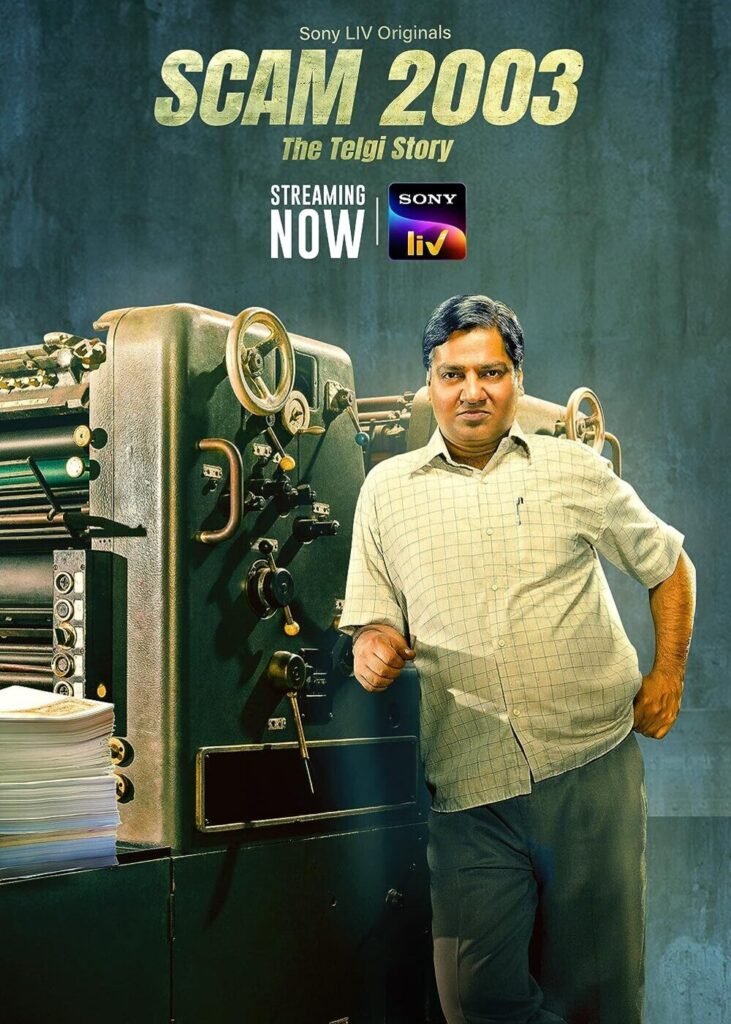Scam 2003: The Telgi Story – An Intriguing but Flawed Entry in the Scam Franchise
The second installment in the Scam franchise, “Scam 2003: The Telgi Story,” unfolds in five episodes that focus on the rise of Abdul Karim Telgi. Directed by Tushar Hiranandani, the series features a captivating performance by Gagan Dev Riar as Telgi.
In contrast to the flashy flamboyance of Harshad Mehta in “Scam 1992,” Telgi maintains a low-key and understated presence, fully aware of the dangers of drawing attention to himself. We are introduced to Telgi on a train, selling fruits wrapped in a photocopy of his B.Com degree certificate. His focused dialogues and unique character catch the attention of a well-wisher, leading him to Bombay, where he helps boost the revenue of a local guest house. After falling in love with the owner’s daughter and marrying her, Telgi goes to Saudi for a few years. Upon his return, Telgi’s story truly takes off.
Based on Sanjay Singh’s book ‘Telgi Scam: Reporter’s Ki Diary’ and with a screenplay by Karan Vyas, Kiran Yadnyopavit, and Kedar Patankar, the series delves into Telgi’s focus on stamp papers. The initial scenes provide insight into the production and distribution of stamp papers across the country. Telgi’s plan is to replace real stamp papers with fake ones in just six minutes by breaking into a moving train. Once successful, he aims to work with corporate companies and obtain an official license for a larger operation. However, the risks involved begin to surface.
The central themes of ambition, greed, and the wealth gap between the rich and the poor are explored in this classic underdog story. While “Scam 1992” effectively portrayed the pursuit of power rather than mere wealth, “Scam 2003” occasionally struggles to maintain this context. The screenplay takes too long to establish Telgi’s modus operandi, and certain sequences lack depth and attention to detail. For example, a scene where Telgi meets a politician and offers him a bouquet filled with money feels hollow and unfocused.
Although the supporting characters and their involvement in the central story are fascinating, the groundwork for their development is lacking. The voiceover by Telgi feels rushed and at times spoon-feeds viewers. Additionally, the portrayal of Telgi from one perspective limits the depth of his character, despite Gagan Dev Riar’s commendable performance. The actor infuses the character with a restless energy, but the screenplay fails to fully utilize his talent.
The decision to split the series into two parts is questionable. With the first five episodes solely focusing on Telgi’s rise, the abrupt “To be continued” conclusion may hinder the overall reception of a story that relies on the juxtaposition of rise and fall. Only time will tell how this decision plays out.
Overall, “Scam 2003: The Telgi Story” showcases a compelling narrative and a standout performance by Gagan Dev Riar. The series, however, suffers from pacing issues and a lack of depth in certain aspects of the storytelling. Despite these flaws, it remains an intriguing addition to the Scam franchise and is worth a watch for fans of the genre.

Scam 2003: The Telgi Story Review: Intriguing Yet Lacks Depth with Pacing Issues
“Scam 2003: The Telgi Story” delves into one of India’s most notorious financial scandals, shedding light on the intricacies of the stamp paper scam orchestrated by Abdul Karim Telgi. While the subject matter is inherently intriguing, the series falls short in certain aspects.
The narrative provides a glimpse into the world of white-collar crime and political corruption, as it follows the rise and fall of Telgi and his empire of counterfeit stamp papers. The storytelling attempts to uncover the various layers of the scam, from its inception to its eventual exposure, offering a sense of the systemic failures and complicity that allowed it to flourish.
The cast delivers commendable performances, with Pratik Gandhi portraying Telgi with a convincing blend of charm and cunning. However, the character development remains somewhat shallow, leaving the audience wanting more insight into the motivations and inner workings of the key players.
One of the primary drawbacks of “Scam 2003” is its pacing issues. The series tends to drag in certain parts, losing momentum and failing to sustain the viewer’s engagement consistently. The narrative structure could have been more taut, with a more balanced distribution of plot points.
Another aspect where the series falls short is in its exploration of the socio-political context of the scam. While it touches on the involvement of politicians and bureaucrats, it could have delved deeper into the systemic issues that enabled such a large-scale fraud to occur.
Despite these drawbacks, “Scam 2003: The Telgi Story” manages to offer a decent overview of a complex financial scandal. It serves as a reminder of the need for robust checks and balances within the financial system and the consequences of unchecked corruption. If you have an interest in financial crimes and scandals, this series may still be worth a watch, but be prepared for some pacing issues and a lack of in-depth character development.


